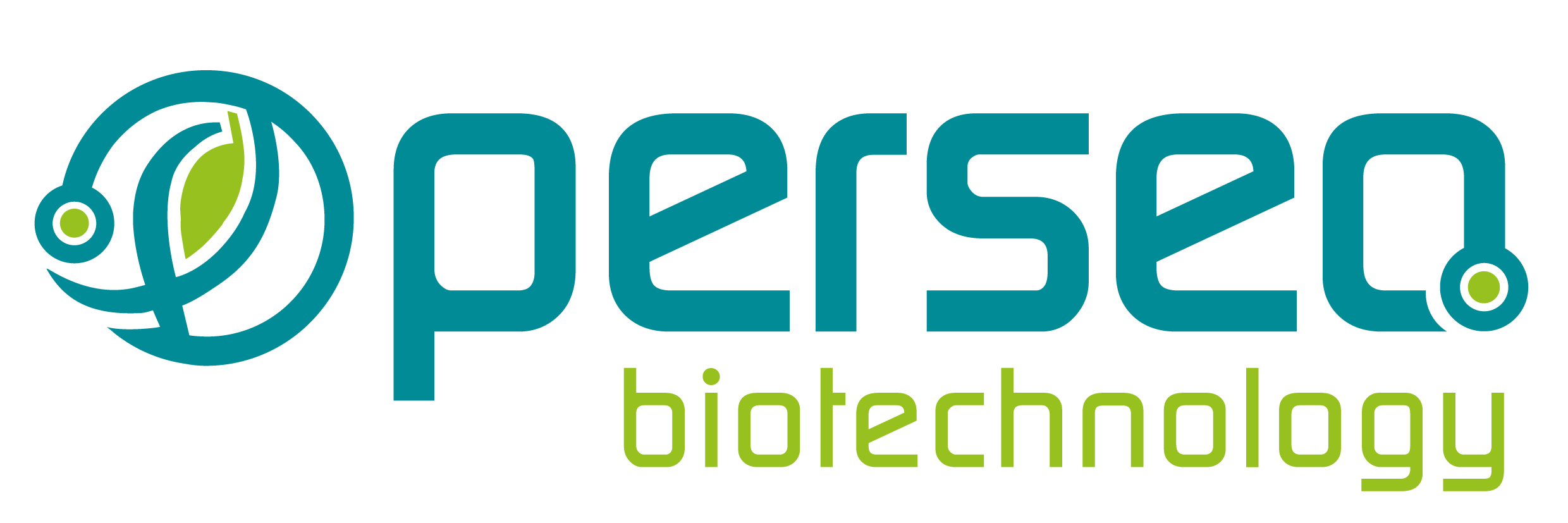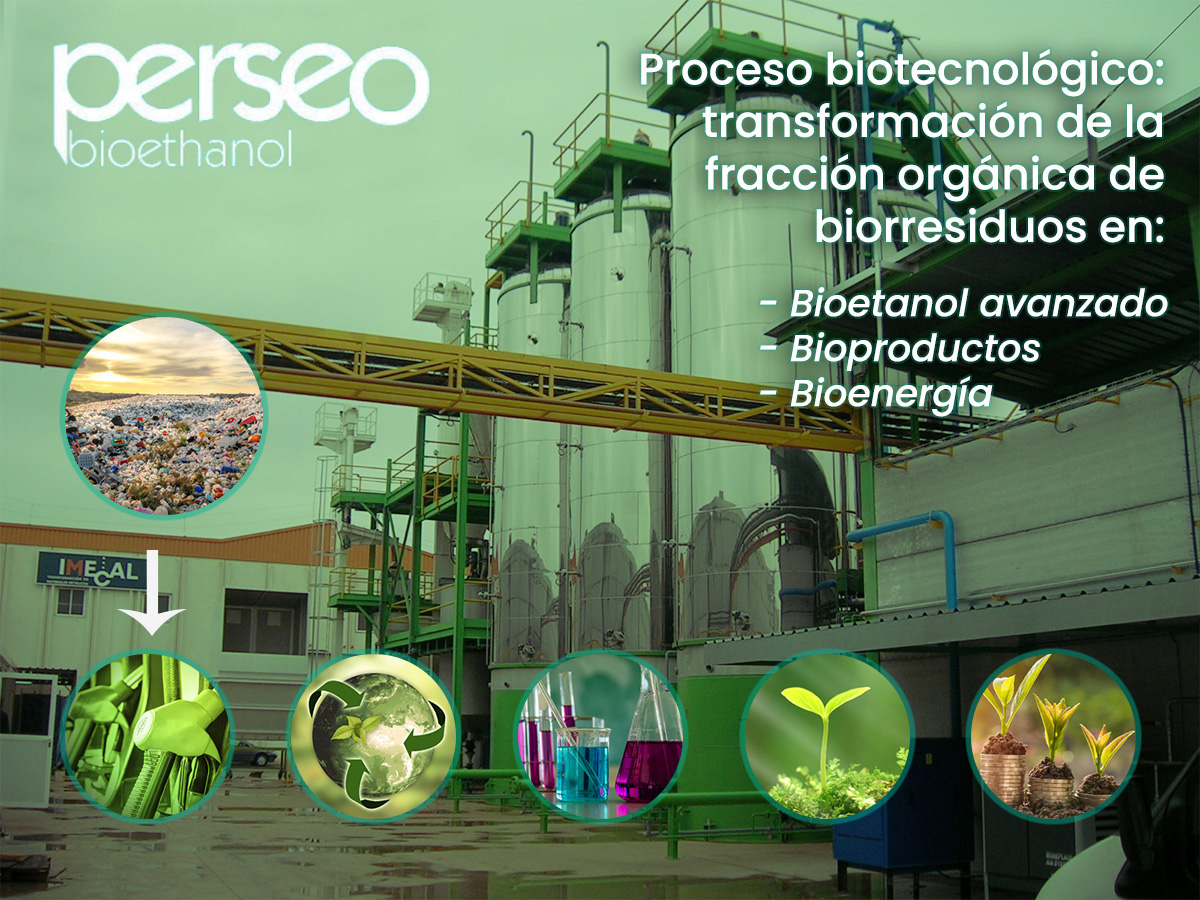
PERSEO Biorefinery
¿What do we do?
A biorefinery to treat organic solid residue
Biotechnology process for the transformation of organic solid residues into:
- second generation bioethanol
- bioproducts
- bioenergy
PERSEO Biorefinery
Bioetanol
The main use of bioethanol is currently as a biofuel in vehicles or as fuel additive. Compared to traditional fossil-based fuels, bioethanol produces lower greenhouse gas emissions, with a positive global balance, as CO2 emissions are compensated with the process of biomass regeneration that is the basis for bioethanol production.
Bioethanol is also used in the drinks industry and as renewable raw material (chemical building block) for the chemical industry, for the production of ethylene, propylene, diethyl ether, 1,3 butadiene, ethyl acetate, etc. In fact, bioethanol has been identified as one of the top 10 precursors from biomass with the highest potential for the chemical industry by the Energy Department of the United States.
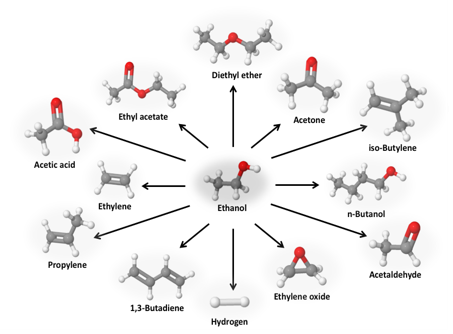
Ethanol as building block for the production of valuable chemicals (Bienfait and Ertl, 2013).
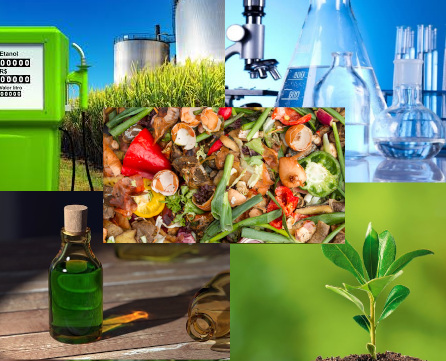
The global bioethanol market was 100 billion liters in 2014. However, a production of 150 billion is estimated for 2020, which corresponds to a 50% increase compared to current market volume. An increase in the European market from 3 billion € in 2013 to 13 billion € in 2030 is expected. At the moment, bioethanol is mainly produced from edible biomass (first generation bioethanol), such as sugar cane in Brazil or starch in the USA. However, due to competing with feedstock and worrying over ecological systems, the recent trend has switched to other non-feedstock-based biomass (lignocellulosic materials from agricultural, industrial and municipal residues) that have lower costs and are abundant. The second generation lignocellulosic bioethanol (also known as advanced bioethanol)is very close to commercialization, with the first plants currently being built or under construction.
PERSEO Biorefinery
Bioenergy
The produced biogas during the anaerobic digestion of the residual organic fraction of the PERSEO Bioethanol process represents a renewable energy source due to its high methane (CH4) content. It is expected that the current European network of arount 14,000 anaerobic digesters will increase to supply up to 18-20 million Nm3 in 2030, according to the last European Biogas Association estimations. In this context, the development of novel biotechnologies for the valorization of biogas through purification into biomethane, will contribute to the EU objective of developing a new European biotechnology that is less dependent on fossil fuels and is based on using biobased raw materials and bio-processing methodologies. Using biogas from the digestion of the organic fraction of wastes, guarantees the sustainability of feeding for the production of biomethane. The use of biomethane as a substitute for natural gas can achieve a significant reduction of GHG emissions, saving more than 80% when compared to other fossil fuel alternatives. This will also contribute to the EU compromise in reducing the GHG emissions together with the new bioenergy production objectives. Other main bioproducts that can be produced from PERSEO bioethanol® process is biofertilizer.


PERSEO Biorefinery
Bioproducts
Other main bioproducts that can be produced from PERSEO bioethanol® process is biofertilizer. The solid biofertilizer sector is competitive with traditional mineral and organic-mineral fertilizers. The increasing awareness for the protection of the environment, feedstock industry and the increasing price of chemicals where significantly responsible for giving the necessary stimuli to the biofertilizers industry. It is foreseen that the global biofertilizer market reaches 1.88 billion dollars in 2020, increasing by 14% since 2015. The market was dominated by USA and Europe in 2014 and corresponded to 50% of biofertilizer market share. It is foreseen that the Asia-Pacific region arises as the fastest growing economy between 2015-2020 due to the price increase in chemical fertilizers and feedstock demand due to the population raise. Regarding biofertilizer types, it is foreseen that the nitrogen-fixing biofertilizers market will have the highest market share, with the cereal and grain crops as the main market.
Traditional Other bioproducts
The PERSEO Biorefinery process allows the production of other high value bioproducts through the biological conversion of low-cost sugars obtained during the bioresidues hydrolysis.
PERSEO Biorefinery
Urban Biorefinery
The main. Sustainable process for the transformation of the Organic Fraction of MSW into bioethanol, bioproducts and bioenergy.
The elimination of daily produced municipal solid waste (MSW) by society is one of the main environmental problems nowadays. Valorization of the organic fraction of MSW through PERSEO process, is a great advancement to the treatment and elimination of the MSW.
PERSEO BIOTECHNOLOGY, through its patented process and its demonstration plant, is pioneering the transformation of MSW into second generation bioethanol, bioenergy and bioproducts.

PERSEO Biorefinery
PROJECT ADVANTAGES

Optimized
process

Higher economic return

Processing compatibility

Adapted
solution

Downstream process stabilization

Carbon footprint reduction
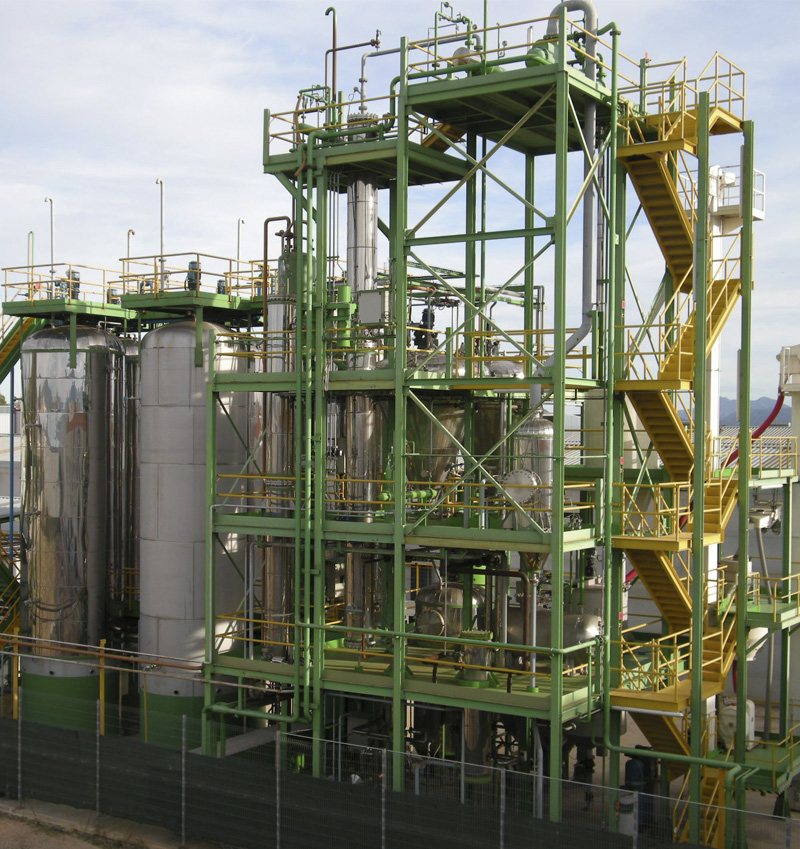
PERSEO Biorefinery
Semi-industrial plant
The process in real, feasible, reproducible and profitable.
Projects demonstration at a semi-industrial scale with a pilot plant with a capacity of 25 tons per day from 2007.
Technology:
- Simple biotechnological process
- Compatible with current MSW treatment plants
- Better economic results than current MSW treatment technologies
¿Are you interested in our projects?
If you are interested in our projects or just want to request more information, do not hesitate in contacting us…
